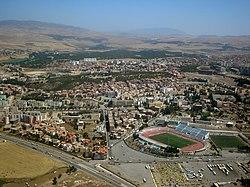On May 8, 1945, as Europe celebrated Victory in Europe (VE) Day marking the end of World War II, a brutal and often overlooked chapter of colonial history unfolded in Sétif, Algeria. What began as pro-independence demonstrations quickly escalated into violent crackdowns by French colonial authorities, resulting in the deaths of thousands of Algerians. Decades later, the Sétif massacre remains a pivotal moment that galvanized the Algerian independence movement and is widely regarded as a turning point that ultimately led to the unraveling of France’s colonial empire in North Africa. This article revisits the events of that fateful day, their lasting impact on Franco-Algerian relations, and why remembering Sétif is crucial to understanding the complex legacy of colonialism in modern France.
Remembering the Sétif Massacres and Their Impact on Algerian Independence
The brutal repression in Sétif on May 8, 1945, stands as a pivotal moment in the history of France and Algeria, marking the violent rupture between colonial rulers and a population demanding dignity and freedom. What began as a peaceful demonstration celebrating the Allied victory in Europe quickly escalated into a massacre, as French authorities responded with overwhelming force. Tens of thousands of Algerians, including civilians, were killed, and entire villages were razed in retaliation. This massacre irrevocably shattered any illusions of French benevolence in its colonies, planting the seeds of a determined independence movement.
The aftermath of the Sétif massacre catalyzed a series of developments that shaped Algeria’s eventual path to liberation. Key impacts include:
- Galvanizing nationalist resolve: The violent suppression exposed the dangerous realities of colonial domination and united disparate groups around the cause of independence.
- International attention: News of the massacre spread globally, highlighting the contradictions of French claims of liberty while denying basic rights to its colonial subjects.
- Long-term political consequences: The events accelerated the decline of French colonial authority and set the stage for the Algerian War of Independence a decade later.
| Aspect | Before Sétif | After Sétif |
|---|---|---|
| Colonial Policy | Restrained repression | Harsh military crackdowns |
| Algerian Nationalism | Fragmented movements | Unified front for independence |
| French Public Opinion | Limited awareness | Growing criticism of colonial practices |
Uncovering the Untold Stories of Colonial Violence on VE Day
May 8, 1945, celebrated as Victory in Europe (VE) Day across the globe, held a vastly different and somber significance in the Algerian town of Sétif. While much of Europe rejoiced the end of Nazi occupation, the streets of Sétif became the stage for a brutal crackdown on Algerian nationalists demanding independence from French colonial rule. The violent repression that unfolded over the following weeks is often overshadowed in mainstream narratives, yet it represents a pivotal moment in the history of decolonization. Estimates suggest that thousands of Algerians were killed as French forces employed disproportionate force, marking “the massacres that lost Algeria for France” – an event that sowed deep-seated resentment and galvanized the Algerian struggle for sovereignty.
The overlooked tragedy encompassed:
- Peaceful protests that escalated into violent clashes following French authorities’ intervention
- A widespread campaign of military and paramilitary retaliation targeting civilians in Sétif and surrounding villages
- A significant death toll, with Algeria’s indigenous population subjected to mass arrests, torture, and summary executions
- The international silence and historical minimization of the incident in post-war commemorations
| Date | Event | Casualty Estimate |
|---|---|---|
| May 8, 1945 | Peaceful protests in Sétif | Several dozen wounded |
| May 9-15, 1945 | French military repression | Between 6,000 and 20,000 killed |
| Post-May 15 | Continued insurgency and arrests | Thousands detained |
The Sétif massacre fractured the illusion of benevolent colonial liberation promised by France. For many Algerians, VE Day in 1945 did not mark freedom from tyranny but exposed a new dimension of violence embedded within colonial governance. This rupture deepened the chasm between France and its North African colony, catalyzing a protracted war for independence that would reshape both nations. Understanding these events is crucial not only to honoring the victims but also to confronting the legacies of colonial violence that continue to reverberate in contemporary discourse on memory and justice.
Calls for Historical Reckoning and Reconciliation Between France and Algeria
Decades after the tragic events in Sétif on May 8, 1945, calls intensify for France and Algeria to confront their shared history with honesty and depth. The massacres, which erupted during Victory in Europe Day celebrations, remain a pivotal moment that underscored colonial tensions and foreshadowed Algeria’s eventual struggle for independence. Victims and historians alike emphasize the necessity of official recognition and collective memory to heal wounds that persist in political discourse and social consciousness on both sides.
Key demands put forth by activists and scholars include:
- Formal apology from the French government acknowledging the scale and gravity of the 1945 repression
- Installation of joint memorials in France and Algeria dedicated to the victims
- Integration of these historical events into educational curricula to foster understanding
- Collaborative research initiatives to uncover archival evidence and testimonies
| Year | Event | Impact |
|---|---|---|
| [1945[1945 | Sétif Massacres | Thousands of Algerians killed; sparked independence movement |
| 1962 | Algerian Independence | End of French colonial rule |
| 2021 | Presidential Acknowledgment | French president recognizes repression but stops short of apology |
In Retrospect
As France continues to grapple with the legacies of its colonial past, the memory of the Sétif massacres remains a painful and pivotal chapter. Marked by violence that unfolded on the symbolic day of Victory in Europe, these events not only foreshadowed the brutal conflict that would ultimately lead to Algerian independence but also challenged France’s national narrative about its empire. Remembering Sétif is essential to understanding the complex and often contentious history between France and Algeria—a history still resonant in contemporary debates over memory, identity, and justice.














